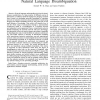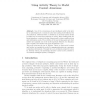756 search results - page 52 / 152 » Understanding COBOL Systems using Inferred Types |
114
Voted
TNN
1998
15 years 2 months ago
1998
Abstract—Natural language understanding involves the simultaneous consideration of a large number of different sources of information. Traditional methods employed in language an...
105
Voted
BMCBI
2008
15 years 2 months ago
2008
Background: Molecular typing methods are commonly used to study genetic relationships among bacterial isolates. Many of these methods have become standardized and produce portable...
146
click to vote
MRCO
2005
Springer
15 years 8 months ago
2005
Springer
Abstract. One of the cornerstones of any intelligent entity is the ability to understand how occurrences in the surrounding world influence its own behaviour. Different states, o...
121
Voted
EVOW
2007
Springer
15 years 6 months ago
2007
Springer
MicroRNAs (miRNAs) form a large functional family of small noncoding RNAs and play an important role as posttranscriptional regulators, by repressing the translation of mRNAs. Rece...
126
Voted
CADE
2010
Springer
15 years 3 months ago
2010
Springer
Beluga is an environment for programming and reasoning about formal systems given by axioms and inference rules. It implements the logical framework LF for specifying and prototypi...


